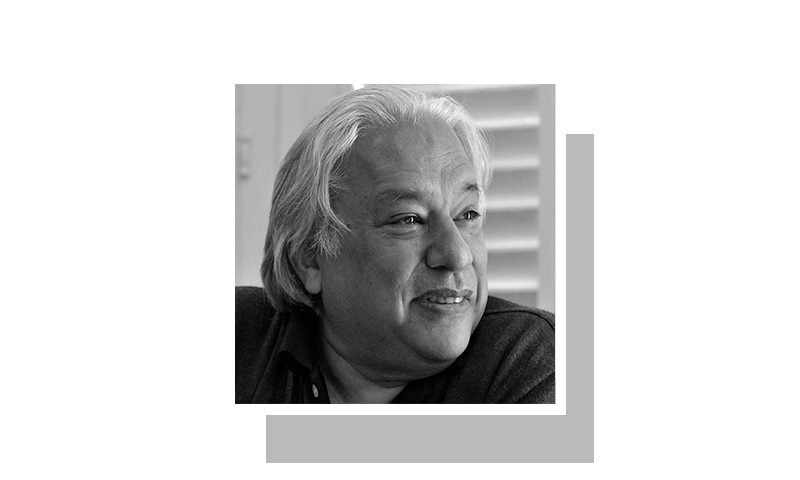EXTRAORDINARILY large cars roam Karachi with fake number plates and, often, Kalashnikov-armed guards sitting in the cabin behind. They follow no traffic regulations, they park wherever they like, and wherever they stop, the armed guards jump out and clear space for their passengers to walk without difficulty. While this goes on, in the same area, motorcyclists are being rounded up, money is extorted by the police from them for supposed lack of documentation or just to bully them; the passersby and citizens just watch, unable to do or say anything.
A mid-ranking government official is supposed to visit a neighbourhood to see its condition. Some hours before he is supposed to arrive, the police move into the area with the ‘sanitary’ staff of the KMC. The police force the thelaywallahs and workmen in the area to leave the site and, in the process, the thelaywallahs are caned, their pushcarts overturned, the beggars on the site are slapped and their clothes torn (including those of women beggars). The sanitary staff, meanwhile, cleans up the area of solid waste and makes the streets presentable. Helpless citizens watch from the balconies and windows, unable to react.
Karachiites now use the word ‘protocol’ for the semi curfew that is imposed on an area through which the convoy of big shots passes. Ten to 15 minutes before the protocol, some roads are blocked for traffic, and people wait patiently for the convoy to pass. It’s a long convoy: the enormous car of the VIP, motorcyclists for security purposes, two vehicles of gun-carrying security, an ambulance, and 10 to 12 vehicles of hangers-on. When the roadblocks are removed, huge traffic jams develop.
Then, whenever there is a cricket match or an arms exhibition at the Expo Centre, major arteries of the city are blocked and a journey of 20 minutes under normal circumstances can take up to two and a half hours. There are large gridlocks, ambulances cannot move, and children and old people suffocate. The general public is kept uninformed that these blockages are going to take place, except through the police FM radio channel 86.4.
Why should laws not be violated?
Numerous pedestrian bridges have no railings left on them. It is said that addicts have taken them away for the purchase of heroin and other drugs. Because of this, seven months ago, two young boys fell off a pedestrian bridge and broke their legs. The railings have not yet been replaced. There are constant complaints from the ‘gentry’ that traffic on the roads is unbearable and that the drivers do not know how to drive. Yes, that is true, but it is because a driving licence is purchasable in Karachi from the police without a formal driving test and there are big complaints regarding conflicts over parking spaces, usually caused by large ‘official’ cars and bhatta-paying rickshaws.
Except for a few main arteries, Karachi’s roads can hardly be called roads. They are full of potholes; at places, kilometres-long stretches are no longer carpeted, and during the rains, they are higher than the land on either side of them — because of which, rainwater cannot be drained from the settlements in which they are located. Due to these reasons, there is a sharp increase in travel time, and according to press reports, Karachiites riding motorbikes have developed severe back problems.
It is interesting to note here that at an official meeting, the secretary of the Minibus Drivers Association told the KDA’s traffic engineering team that their schemes would not solve Karachi’s transport problems, but that making efficient roads and wide pavements would. It would reduce travel time, save their buses from damage, and they could even consider the lowering of fares.
All over the city, there are parks which have been turned into garbage sorting and recycling units; children are forced to play on the streets or not play at all. Meanwhile, the Supreme Court-supported demolition of people’s homes, schools and other community spaces have made people homeless, hawkers with their affiliated businesses jobless in the tens of thousands, and put thousands of students out of school. At the same time, Imran Khan’s illegally built house on 300 kanals was regularised at a cost of only Rs1,200,000.
Given the above-mentioned state of affairs, young people increasingly ask why they should obey traffic rules and regulations, respect the judiciary, and not indulge in street crime due to joblessness and inflation, and why they should not violate the law to make life easier for themselves. If the elite and rich can do it, then why should they be forbidden? I, for one, understand and respect their feelings and find it very difficult to disagree with them. Such a large and angry younger generation bodes ill for us. n
The writer is an architect.
arifhasan37@gmail.com
www.arifhasan.org
Published in Dawn, March 5th, 2023













































Dear visitor, the comments section is undergoing an overhaul and will return soon.